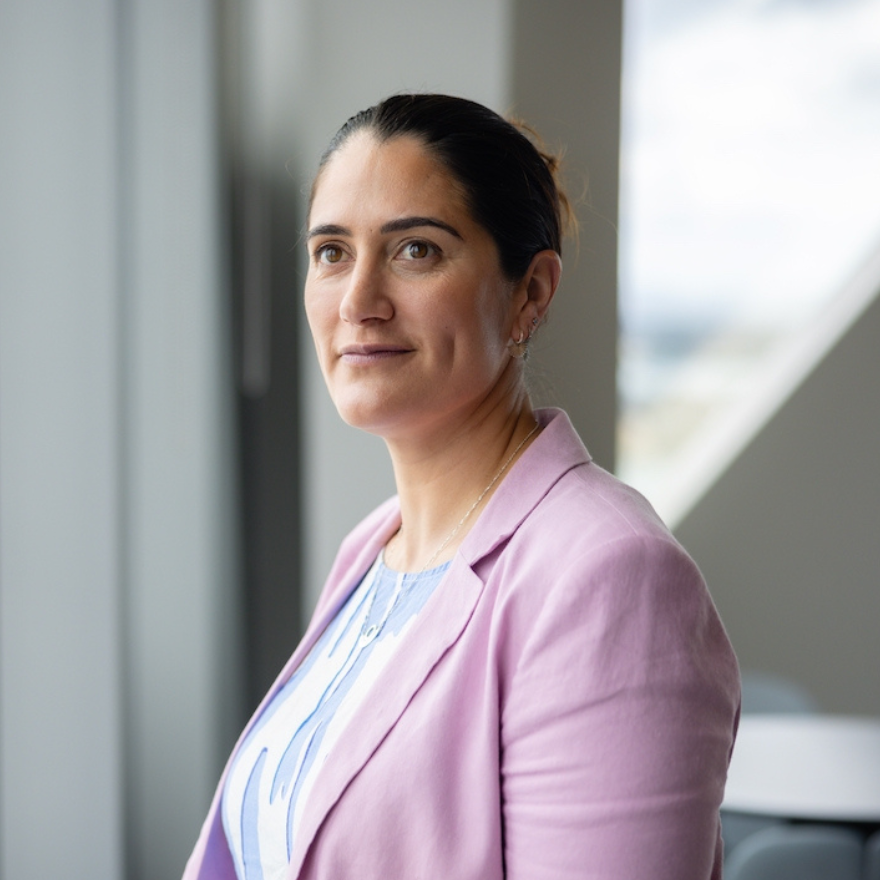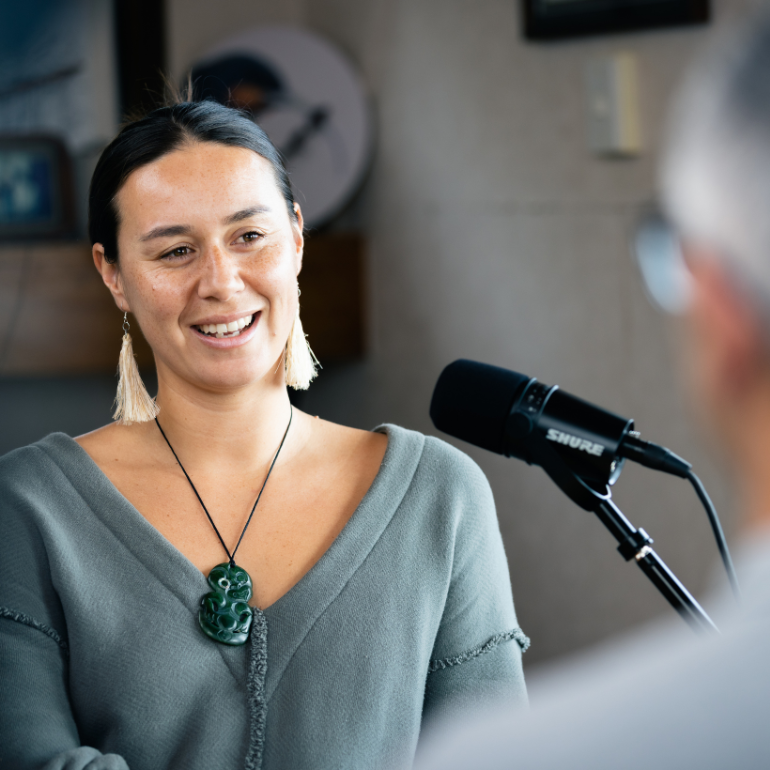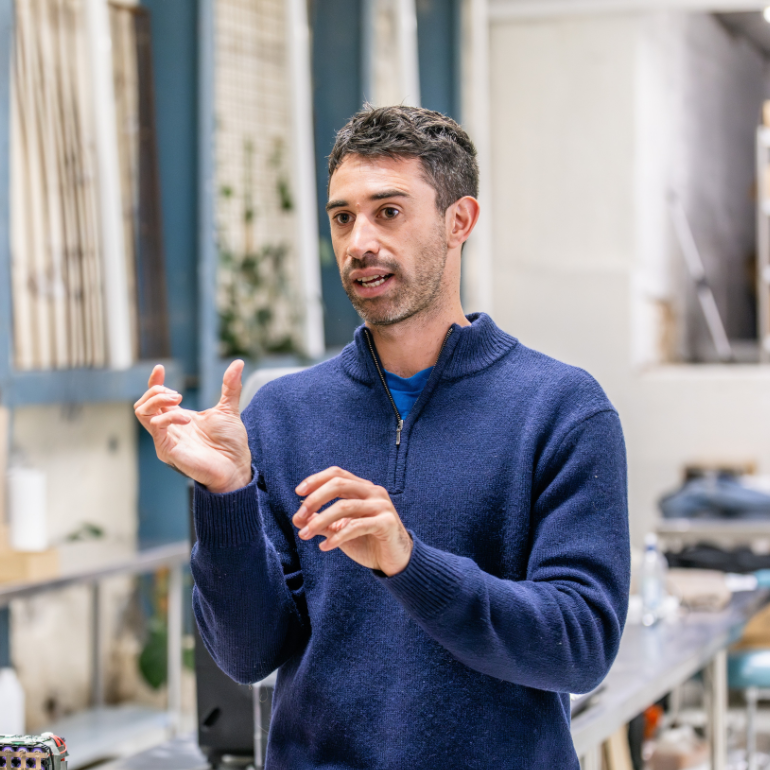You won’t find many more passionate than Dan Te Whenua Walker (Ngāti Ruanui, Ngāruahine, Ngāti Kahungunu ki Wairoa, Tūhourangi, Ngāti Maniapoto) when it comes to connecting te ao Māori with tech and AI solutions.
Although he has deep ancestral roots in Taranaki, Walker was born and raised in Christchurch after his mother moved there as part of the Māori Trade Training Scheme and met his Kiwi father with Scottish and Irish roots. “I grew up quite disconnected from who I was, away from my marae and my reo,” he says, calling it an identity crisis of sorts. “I didn’t really feel like I was brown enough, or white enough.”
A return home to Taranaki, where he learned about his whakapapa at his grandmother’s side, saw an awakening in Walker. He now speaks te reo Māori proudly, with its distinctive Taranaki dialect. “Being Māori is our superpower,” he says with a smile.
After he met wife Michelle, they moved to Tāmaki Makaurau where they live with their three children. The proud former high school dropout has carved out a career that started in retail and has ended up at tech giant, Microsoft, where he has worked for the past four years and now holds the role of Australia & New Zealand Partner Development Manager - Global Partner Solutions and the Indigenous Lead for Aotearoa New Zealand. He also holds two Masters degrees.
Walker is passionate about Māori and rangatahi involvement in the tech, coding and AI space. He says that while there aren’t enough currently – “I could probably count them on two hands inside Microsoft” – he sees it as a huge opportunity for Māori. “I always say, tech is good for Māori, and Māori is good for tech, because we can bring values and world views to the discussion that aren’t always considered.”
Microsoft House in Tāmaki Makaurau regularly hosts coding sessions for schools, where students even learn how to code in Minecraft. He has brought his own whānau to Auckland from Hāwera to explore 3D printing. “We try to make it a space for the hapori, for the community.”
As well as being the Indigenous Lead for Aotearoa, Walker was previously global co-chair for Indigenous at Microsoft, one of the company’s employee resource groups, that includes members from the Pacific Islands, Australia, American and Canadian First Nations, South America and Hawai’i. “There was only about 40 of us when we first launched, but now we’ve got about 3000. That’s a real community.”
Walker says that a recent Indigenous Heritage Month event hosted by Microsoft showcased similar climate struggles, and solutions, between First Nations Australian and American peoples in controlled burnings to prevent wildfires. Water and land management were also common themes among all the Indigenous cultures. He adds that here in Aotearoa, AI solutions for climate risk mitigation and land management have already been utilised by Māori land block owners. “There are some real innovative land trusts in central North Island who have been using an AI and Internet of Things (IoT) solution to connect into many different data points to measure the hauora (health) of soil, of water, all aspects. That’s been around for a while.”
One digital pilot, a ‘Lighthouse Project’, is a collaboration between the Aware Group, the Ministry for Environment, and other entities for Ngāti Toa Rangatira. The project focuses on data and AI applications for monitoring local wāhi tapu streams and rivers. Combining historic records and oral histories from Ngāti Toa with publicly held data and Microsoft machine learning tools, the platform visually represents the Kenepuru Stream and Porirua Harbour over time, through colonial land reclamation and other human influences. It also shows how these regions may change in the future with the impacts of climate change.
There’s also Tupu.nz, a digital portal by NV Interactive that enables Māori landowners to reconnect with their land, streams, rivers and mountains.
“Our perspectives around ownership and how we truly connect to everything through whakapapa… These are things the world is catching up to now,” says Walker. He adds a perspective that some may find challenging: that tech and AI hold mauri (a life essence).
“We do a mihi to the land, to the sea, to a maunga. The concept that they’re not ‘human’ doesn’t come into the kōrero at all. That is something tech needs to think of as well. We know mauri exists in everything. And technology has a mauri. Data has mauri, code has mauri, because it's imbued with the mauri of its creator.”
“What if we started applying the same concepts around pepeha?” he asks. “As an AI – where do you come from? Who are your creators? Where’s your whakapapa from? Bringing that stuff forward so that concerns around bias, or whether Māori were involved in its creation, all of that can be put to the front.”
The ongoing challenge, though, is participation. He says it’s incumbent on those already in the space to be role models for their whānau hapū iwi. “Once we start seeing our cuzzies, aunties, uncles in this space, it builds up trust. A lack of representation results in a lack of trust.”
He outlines pathways that can lead rangatahi to a career in tech. “They can be different types of internships, it can be going to spaces where they feel more comfortable, places like marae, or it can be purposeful approaches in school and kura.”
Lastly, he says, removing barriers such as bias in interviews and the ‘cultural tax’ (the additional cultural labour that often falls to Māori in corporate settings) will ensure a safer environment to attract Māori to.
“We need them to help create culturally responsive AI and to truly engage in a way that helps companies like Microsoft, Google and Facebook using AI to ensure that our perspectives are brought to the fore.”
It’s about being intentional, he reckons. “We need to be intentional on both sides – Microsoft needs to be intentional but so do Māori.”
Watch the full interview with Dan Te Whenua Walker here.


